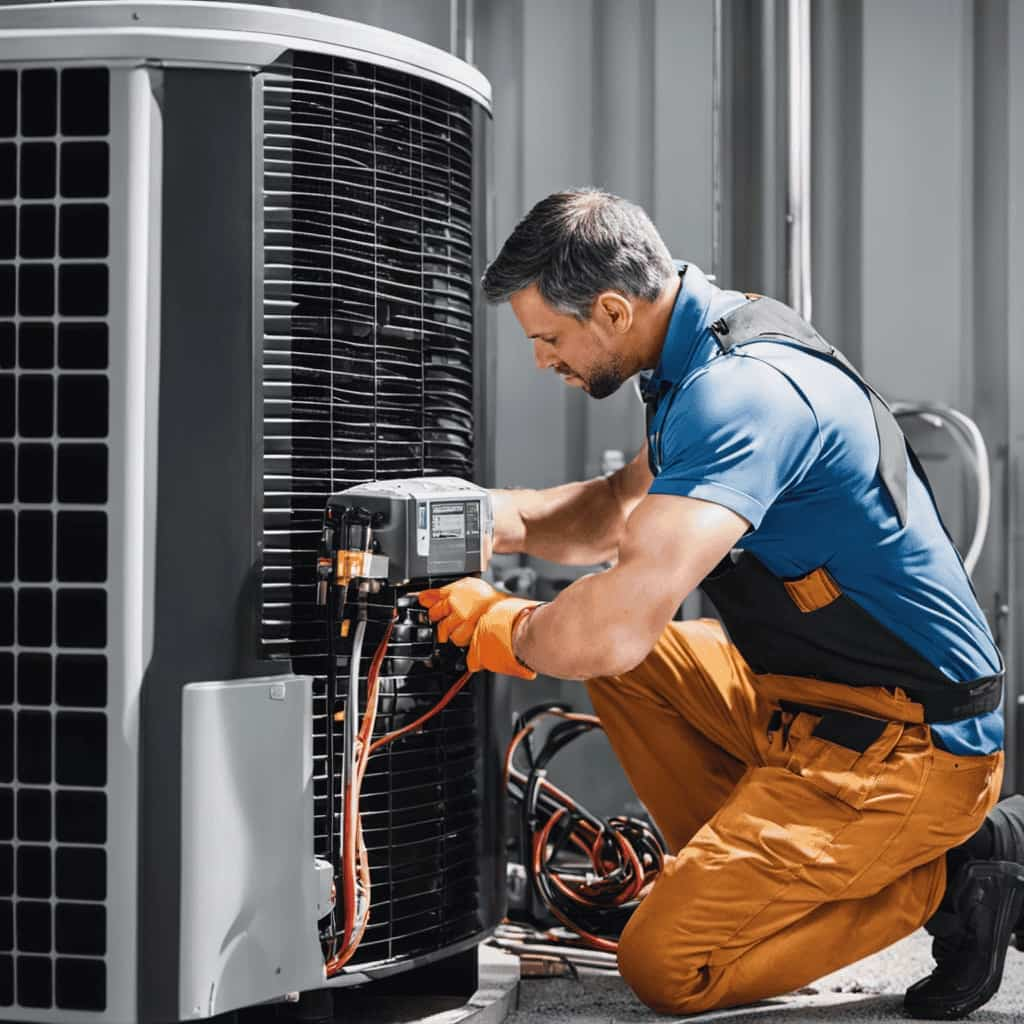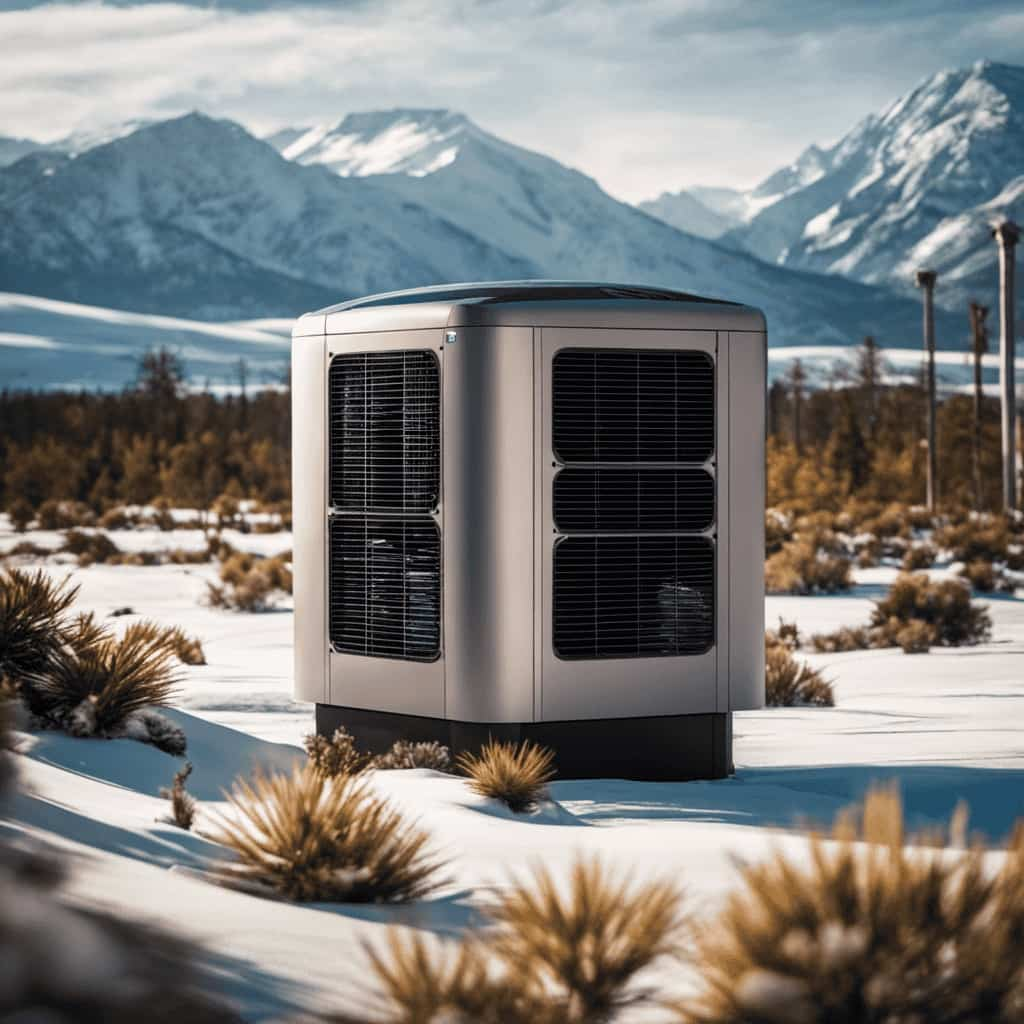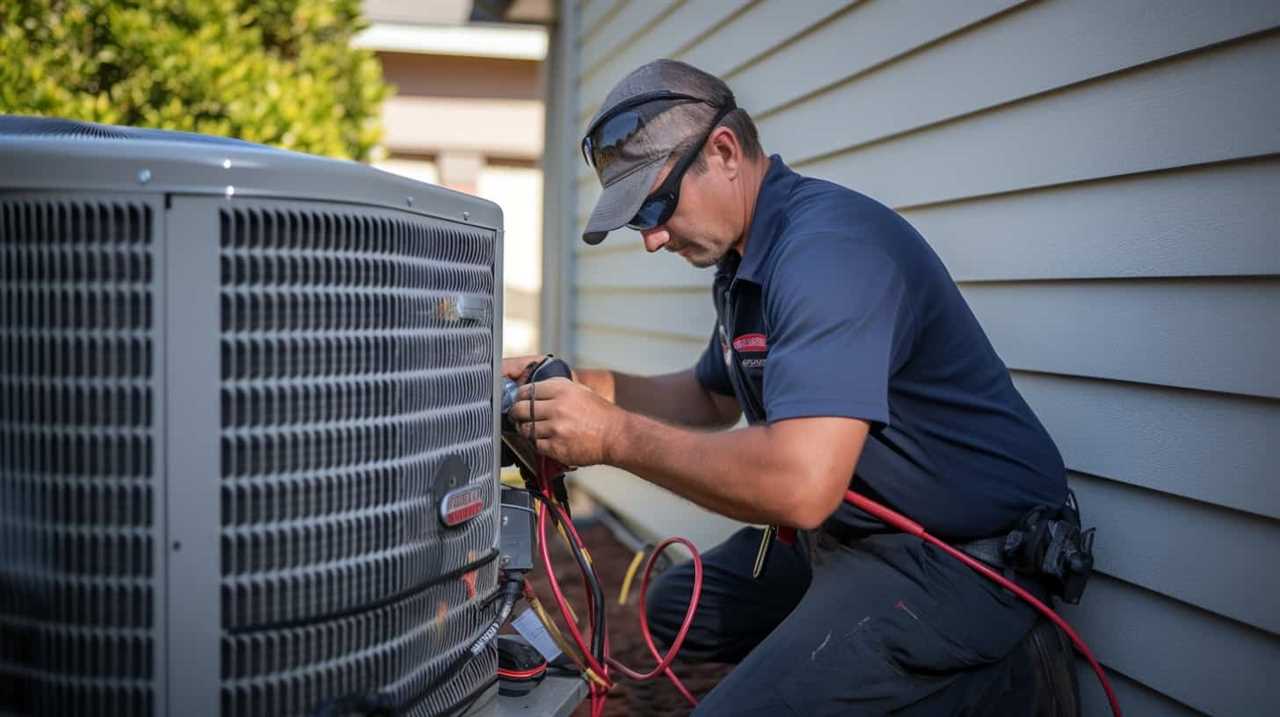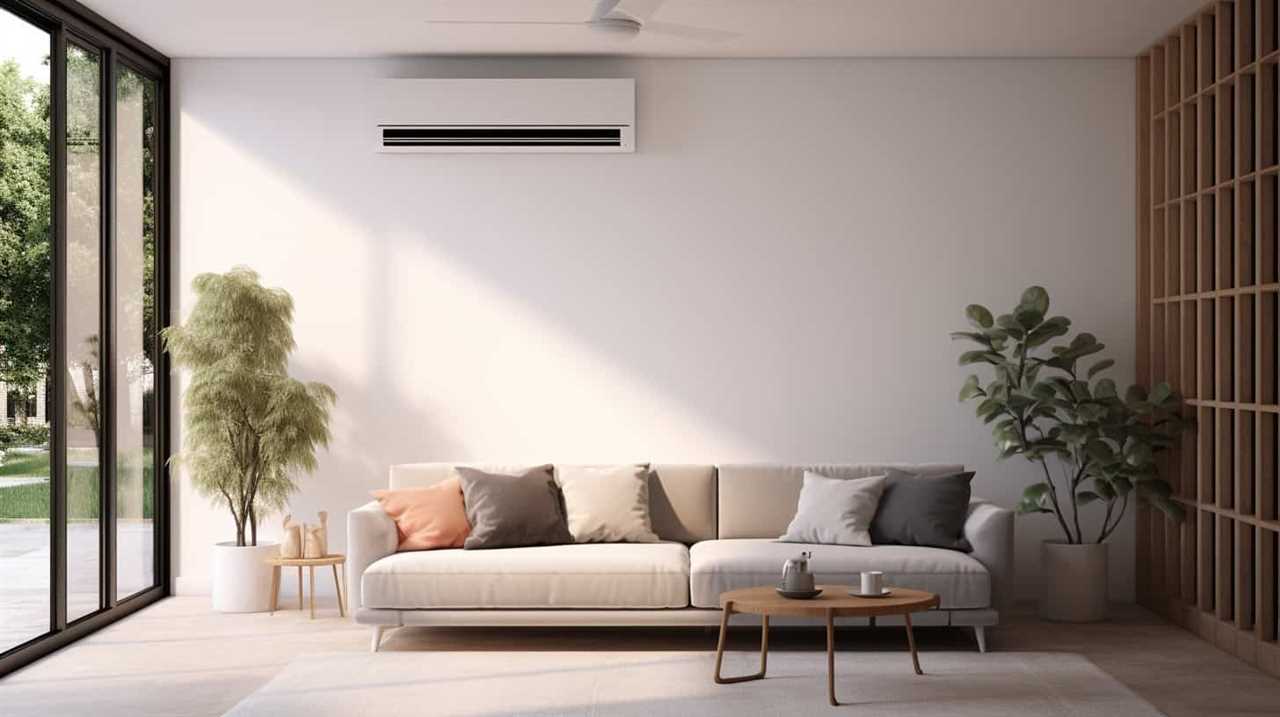Are you fed up with expensive energy bills and ineffective heating and cooling systems? Don’t worry! In this article, we will demonstrate how you can save money with efficient heat pump HVAC systems.
We’ll explore the benefits of these systems, factors to consider when choosing one, and tips for maximizing energy savings.
We’ll also share cost-saving strategies and maintenance tips for long-term savings.
Say goodbye to wasted energy and hello to lower bills with our expert advice.

Key Takeaways
- Regular maintenance is important for efficient operation and to prevent costly repairs or replacements.
- Energy efficiency can be maximized through proper insulation, smart thermostat use, and regular air filter replacement.
- Optimal thermostat settings and scheduling can help save on energy bills.
- Hiring reputable HVAC contractors for installation and following a maintenance schedule can result in long-term cost savings.
Benefits of Efficient Heat Pump HVAC Systems
We love the efficiency of heat pump HVAC systems because they provide cost savings and environmentally friendly heating and cooling.
Energy efficient heat pump models are designed to use less electricity compared to traditional heating and cooling systems, resulting in lower energy bills for homeowners. These models utilize advanced technologies, such as variable speed compressors and smart thermostats, to optimize energy usage and provide precise temperature control.
Factors to Consider When Choosing an Efficient Heat Pump HVAC System
There are several factors to consider when choosing an efficient heat pump HVAC system:
-
Energy Efficiency:

-
Look for systems with high SEER (Seasonal Energy Efficiency Ratio) ratings. Higher SEER ratings indicate greater energy efficiency.
-
Consider dual fuel systems that combine a heat pump with a gas furnace for optimal efficiency in colder climates.
-
Look for ENERGY STAR certified systems, as they meet strict energy efficiency guidelines set by the U.S. Environmental Protection Agency.
-
Installation Process:

-
Ensure the system is properly sized for your home, as an undersized or oversized system can lead to inefficiency and discomfort.
-
Hire a reputable HVAC contractor who’s experienced in heat pump installations.
-
Consider the location of the outdoor unit to ensure proper airflow and minimize noise disturbances.
Considering these factors will help you choose an efficient heat pump HVAC system that meets your energy-saving goals.

In the next section, we’ll discuss tips for maximizing energy savings with heat pump HVAC systems.
Tips for Maximizing Energy Savings With Heat Pump HVAC Systems
Let’s explore some strategies for boosting energy savings with heat pump HVAC systems. To optimize the performance of your heat pump and reduce energy consumption, consider implementing the following energy-saving techniques:
| Energy Saving Techniques | Description |
|---|---|
| Regular Maintenance | Schedule regular maintenance checks to ensure that your heat pump is functioning at its highest efficiency. |
| Proper Insulation | Ensure that your home is well-insulated to prevent heat loss or gain, allowing your heat pump to work more efficiently. |
| Smart Thermostat | Install a smart thermostat to regulate the temperature in your home, adjusting it based on occupancy and outside weather conditions. |
| Air Filter Replacement | Regularly replace the air filters in your heat pump to maintain optimal airflow and prevent strain on the system. |
| Efficient Use of Settings | Set your heat pump to the most energy-efficient settings, such as using the "auto" mode and lowering the temperature when you are away from home. |
Cost-Saving Strategies for Operating Efficient Heat Pump HVAC Systems
Implementing energy-efficient practices is key to saving costs while operating efficient heat pump HVAC systems. By utilizing energy efficient technology, you can significantly reduce your electricity bills.
Here are some cost-saving strategies to consider:

-
Optimize thermostat settings: Set the temperature to a comfortable level during occupied hours and adjust it slightly higher or lower during unoccupied hours to reduce energy consumption.
-
Regularly maintain and clean the heat pump system: Dirty filters and coils can reduce the system’s efficiency, leading to higher energy usage. Regular maintenance ensures optimal performance and lower energy costs.
-
Utilize programmable thermostats: These devices allow you to schedule temperature adjustments throughout the day, ensuring efficient operation and reduced energy consumption.
Maintenance and Servicing for Long-Term Savings With Heat Pump HVAC Systems
Regular maintenance and servicing of our heat pump HVAC systems is essential for long-term savings. By following a proper maintenance schedule, we can ensure that our systems operate efficiently and effectively, resulting in lower energy consumption and reduced utility bills.

It’s recommended to have a professional HVAC technician inspect and service the heat pump system at least once a year. During the maintenance visit, the technician will clean and lubricate the components, check for any leaks or refrigerant issues, and test the system’s performance. This preventive approach can help identify and address potential problems before they escalate, saving us from costly repairs or replacements.
Additionally, troubleshooting common issues such as insufficient heating or cooling, strange noises, or poor air quality can be done by referring to the manufacturer’s manual or consulting with a professional.
Frequently Asked Questions
Are Heat Pump HVAC Systems Suitable for All Types of Buildings?
Heat pump HVAC systems are suitable for most buildings. They provide efficient heating and cooling, reducing energy costs compared to traditional systems. Their versatility and energy efficiency make them a popular choice for many building types.
Can Efficient Heat Pump HVAC Systems Replace Traditional Heating and Cooling Systems?
Efficient heat pump HVAC systems can replace traditional heating and cooling systems. They offer the reliability of heat pumps and are cost-effective. With their advanced technology, they provide efficient heating and cooling solutions for all types of buildings.

What Is the Average Lifespan of an Efficient Heat Pump HVAC System?
On average, the lifespan of an efficient heat pump HVAC system is around 15 to 20 years. Regular maintenance is essential to ensure optimal performance and extend the system’s lifespan.
How Do Efficient Heat Pump HVAC Systems Perform in Extreme Weather Conditions?
Efficient heat pump HVAC systems perform well in extreme weather conditions, providing reliable performance in extreme cold. The benefits of these systems include energy efficiency, cost savings, and environmental friendliness.
Are There Any Government Incentives or Tax Credits Available for Installing Efficient Heat Pump HVAC Systems?
Yes, there are government incentives and tax credits available for installing efficient heat pump HVAC systems. These incentives and credits can help offset the initial cost and make energy-efficient heating and cooling more affordable for homeowners.
Conclusion
In conclusion, efficient heat pump HVAC systems are a cost-effective solution for saving energy and reducing utility bills. By considering factors such as size, efficiency ratings, and climate suitability, homeowners can make informed choices when selecting a system.

Additionally, implementing energy-saving tips, such as proper insulation and regular maintenance, can further maximize the efficiency of these systems.
Ultimately, investing in an efficient heat pump HVAC system is like planting a seed that grows into a money-saving tree, providing long-term savings and comfort.









